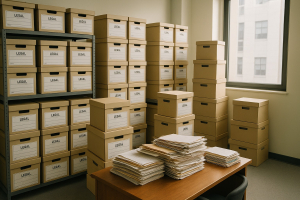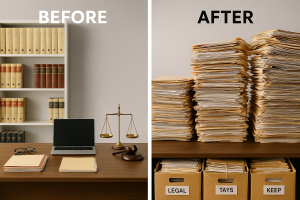The Paper Problem: How Legal Professionals Still Drown in Documents
Managing Document Overload in the Legal Profession
In an age where most industries have gone digital, one profession still holds tight to the printed page: the legal world.
Contracts. Wills. Case notes. Discovery. Duplicates of duplicates. If you’ve ever worked in a legal office, you already know—the paper doesn’t stop.
So why does this happen, and what can be done to manage it without losing your desk under a stack of affidavits?
1. The Reason It Hasn’t Gone Paperless
There’s a good reason for the continued reliance on hard copies in the legal profession:
-
Court requirements: Many courts still demand original documents or certified paper copies.
-
Client comfort: Some clients prefer to review or sign printed contracts.
-
Redundancy and trust: Paper is often seen as more reliable for records.
Digital systems might be improving, but in law, physical documentation is still king.

2. How the Overflow Affects Legal Workflows
The impact of paper clutter isn’t just aesthetic. It can cause real issues like:
-
Delayed access to important case files
-
Difficulty with document version control
-
Loss of valuable workspace and organisation
A busy solicitor doesn’t have time to go digging through ten boxes for one witness statement.
3. The Filing Cabinet Is Not Enough
Traditional filing cabinets once held the line—but in today’s busy practices, they’re often full, mismatched, or spread across multiple rooms. Worse still, important documents can disappear between the gaps.
Modern practices are starting to:
-
Archive older documents off-site
-
Scan and digitise non-essential paper
-
Keep active files within arm’s reach, and store the rest more strategically

4. The Human Cost of Clutter
It’s not just physical clutter—it’s mental clutter too. Legal professionals are under enormous pressure. Losing space and control over your own working environment only adds to the stress.
A streamlined office not only improves efficiency but also contributes to a calmer, more productive workday.
Final Thoughts
Paper isn’t going anywhere just yet in the legal world—but how it’s managed is evolving. Understanding the impact of document overload can help legal professionals regain control, save time, and focus on the work that matters most.
Sometimes, it’s not about going fully paperless—it’s about being paper smart.

